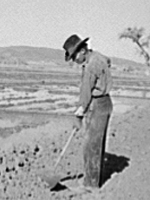
West, James W. (Jake)AboutMemories of high school days during World War II. Collected airbase food scraps for hog feed. Direct contact with German POWs; indirect contact with Italian POWs employed in agriculture. Family sacrifices during World War II; three of Mr. West's brothers were servicemen; one of the three was killed in the war.
Abstract
Tape 1, Side A
West describes his work while in high school, picking up garbage from Ft. Sumner Army Airfield, where the Ratliff brothers had a garbage removal contract, and hauling it off to feed hogs. He tells how he had to separate U.S. Army silverware from the garbage and return it the airfield. He fed 500 hogs daily. West compares the work of the Italian prisoners of war with the German prisoners, saying the Italians would not help lift or wash the cans; the Germans, though, lifted and thoroughly cleansed the cans. The consultant spoke regularly with a German POW who was educated at Columbia University. He also got candy and pie from another German prisoner. West speaks of the family sacrifices during the war. One brother, Cecil, was in Patton's 3rd Army; a second brother, Vane Stanford, was in the 13th Air Force and was killed in India; a third brother, Sidney (Red), was with the Marines on Okinawa and Iwo Jima. A neighbor employed Italian prisoners of war on his farm; they were not good farm workers, Mr. West says, and worked there only briefly. Chores like garbage collection and feeding the hogs made West lose one and a half days of school per week. His mother would not let him enter the service at sixteen. The fighting between the Marines and Japanese on Okinawa, where they took no prisoners, is briefly described. West also describes the turnover of farms, traded or sold, in the Ft. Sumner area. President Harry Truman, he feels, was justified in dropping the atomic bomb to save a further large loss of lives in the war. The truck bought by the Ratliffs for garbage collection was for use in the war effort; vehicles were rationed in World War II. West remembers his uncle and others clearing mesquite from the area of the future Ft. Sumner Army Airfield. The Geneva Convention was followed by the United States in its treatment of POWs, Mr. West says, but not by others. He says he would like to forgive the Japanese but cannot because of their conduct during the war. A local man, Louis (Kildee) Herring, was with the 200th Coast Artillery on Corrigidor and Bataan. He suffered harsh treatment as a prisoner of war for three years.
Tape 1, Side B
West continues with Kildee Herring's story, saying he was allowed the first purchase of a new car in 1946. He had only peripheral vision because of his treatment as a POW, but could bowl if someone told him where the remaining pins stood. He trusted West to tell him. The prisoner of war camp at Ft. Sumner was surrounded with mesh wire and had no towers. The consultant praised the high water quality in the Pecos Valley, making it a healthy place to live and a good place to grow melons, which his family has sold for eighty-four years. West has been selling for forty-four years, including twenty-one years at the farmers market in Santa Fe. POWs who did farm work in the Ft. Sumner area were trucked out from the prison camp with their guards. Mr. West tells an anecdote of his father's winemaking during Prohibition. He says the Italian POWs would not clean garbage cans; German prisoners did. Dr. Moore and Dr. Fikany were doctors in Ft. Sumner at that time. The army base had a chiropractor. West's wife, Leona, went to the POW camp with him one time when they were in high school and would not get out of the truck. A German POW teased him about his "sweetheart". He reflects on the seesaw fighting during the North Africa campaign. Mrs. Stearns, the local newspaper publisher, gave her war-year publications to Eastern New Mexico University. Mr. West describes her and her community involvement. He explains the garbage-pickup procedure, said the Germans were serious and there have been no postwar visits that he knows. One friend, Neal Vaughan, went to Germany after the war to see friends he had made there during the war. Mr. Vaughn was in the First Army, West believes, and tells of Black First Army truckers. Others to speak to include Joe Peña, aircraft mechanic at the Ft. Sumner airfield, and Peña's son, Joe Junior, who made a career of the army. There is an anecdote on Joe Senior learning to fly in a plane unauthorized by the owners. Son Fred Peña is a successful mining engineer. |

